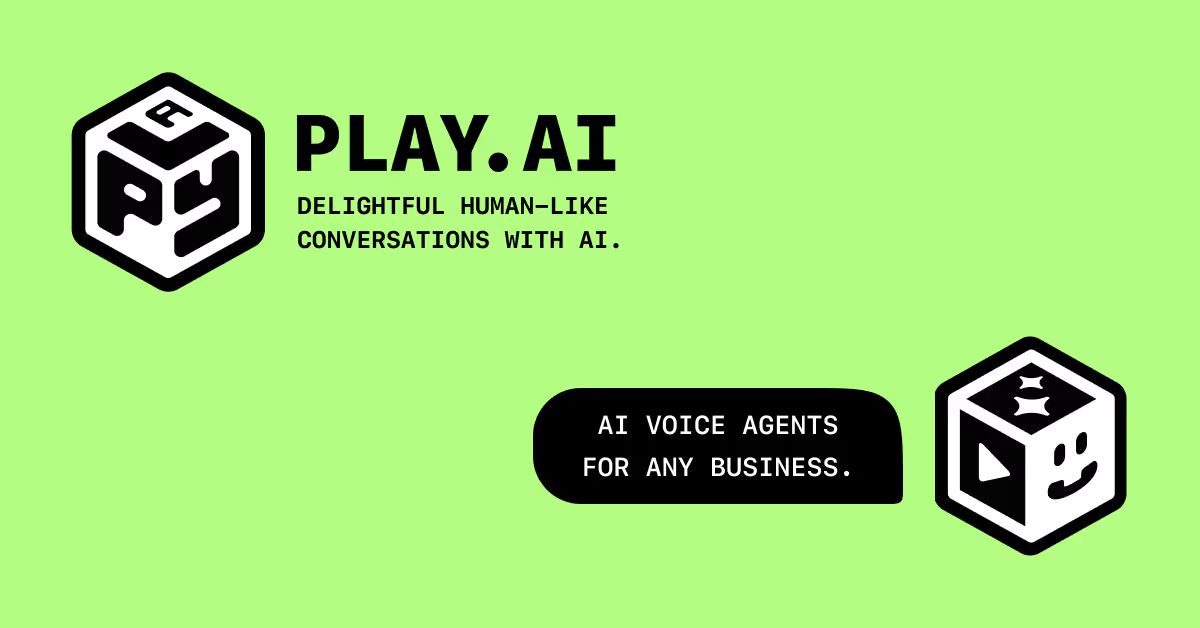
PlayAI envisions a future where human-machine communication is transformed by the power of voice, enriching digital experiences with natural, emotive AI speech that feels deeply human. We strive to democratize voice AI technology, making it accessible and impactful across diverse industries and everyday interactions.
Our mission drives us to craft advanced conversational voice agents and voice cloning tools rooted in cutting-edge machine learning, enabling seamless and meaningful connections between people and technology. Through innovation, we empower enterprises and creators alike to elevate engagement, streamline business operations, and redefine customer service with voice intelligence.
As part of Meta, we are building the foundational voice AI capabilities that will shape the next generation of digital interfaces, making voice interaction an intuitive, expressive, and essential part of how the world communicates with technology.
Our Review
We've been watching PlayAI since they launched in 2021, and honestly, their journey has been one of the most impressive pivots we've seen in the voice AI space. What started as a simple Chrome extension for listening to articles has morphed into something far more ambitious — and Meta clearly took notice.
From Browser Plugin to Voice Revolution
The transformation is striking. PlayAI began by solving a basic problem: helping people consume written content through audio. But founders Mahmoud Felfel and Hammad Syed had bigger plans brewing.
By 2023, they'd built a full developer platform with voice cloning, real-time speech synthesis, and conversational AI agents. The tech supports over 30 languages with local accents, and the quality is genuinely impressive — we're talking human-like intonation and emotion that doesn't sound robotic.
Where the Magic Happens
What caught our attention (and presumably Meta's) is PlayAI's ultra-low latency real-time synthesis. Their voice agents can handle actual business conversations — appointment scheduling, customer service, even transactions — without those awkward pauses that make you realize you're talking to a bot.
The voice cloning feature is particularly clever. It preserves speaker-specific qualities while letting you adjust pitch, speed, and emotion. Plus, they offer on-premises deployment for businesses worried about data privacy, which is smart positioning in today's market.
The Enterprise Play That Paid Off
PlayAI's client roster reads like a Fortune 500 directory: Walgreens, Salesforce, Amazon, IBM. They've deployed voice agents across hospitality, healthcare, real estate, and gaming — proving this isn't just cool tech, it's practical business automation.
The fact that Meta acquired them in July 2025 (bringing their 35-person team into Meta's AI division) tells us everything about where voice AI is heading. When a tech giant buys a startup this early, they're betting on the vision, not just the current product.
What This Means Going Forward
PlayAI's story reflects the broader voice AI boom — the market's projected to hit $1.7 trillion by 2032, and companies like this are laying the groundwork. Their evolution from content consumption to enterprise voice agents shows how quickly this space is maturing.
Under Meta's umbrella, we expect PlayAI's technology to power more natural voice interactions across Facebook, Instagram, and WhatsApp. It's a solid outcome for a company that started with a simple idea and scaled it into something transformative.
Feature
Highly natural, emotive AI voices
Text-to-speech (TTS)
Voice cloning preserving speaker-specific qualities
Conversational AI voice agents
Supports over 30 languages and accents
Real-time ultra-low latency speech synthesis
Customizable pitch, speed, and emotion
Deployment across web, phone, apps
On-premises deployment for data privacy








